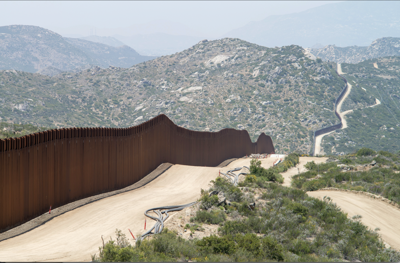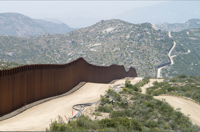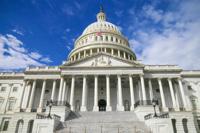
The U.S. and Mexico border. Photo by Greg Bulla
With less than three months until the 2024 presidential election, immigration has once again surfaced as a leading topic at the latest conventions and rallies held throughout the United States.
Despite the use of immigration as a co-opted and divisive political issue, a new study shows that contrary to expectations, based on Republican candidate Donald Trump’s anti-immigrant and anti-trade rhetoric, white voters' tendency to support Trump was higher in counties with lower levels of immigration and trade.
A new report by the UCLA Latino Policy and Politics Institute (UCLA LPPI), published earlier this month, revealed that Trump's strongest voter support came from areas with the least exposure to immigration and international trade.
At the most recent Republican National Convention in Milwaukee, illegal immigration dominated the rhetoric. Trump used immigration as an election strategy in 2016 and he is hoping it will work in his favor again in 2024.
In April, he told TIME Magazine of his plan to conduct mass deportations throughout the U.S. if he were to win reelection, saying he would aim to deport 15 to 20 million people, with the help of the National Guard and even state and local police departments. “This is an invasion of our country,” he told TIME. “An invasion like probably no country has ever seen before. They're coming in by the millions.”
These plans were altered and repeated during the Republican National Convention, where hundreds of attendees waved signs with the phrase "Mass Deportation Now!" and, on the final night of the convention, Trump promised to launch "the largest deportation operation in the history of our country" if reelected.
The new report, authored by Dr. Raúl Hinojosa-Ojeda, associate professor in the UCLA Department of Chicana and Chicano Studies, titled “The Trump Paradox: A Focus On Latino and Latina Voters” analyzed the 2016 and 2020 election cycles.
Hinojosa-Ojeda told CALÒ News that the Trump Paradox, which is a term found throughout the report, is used to describe the phenomenon where the former president received the highest voter support in counties with the lowest levels of immigration and international trade, directly contradicting his campaign rhetoric that emphasized these issues as significant threats to the economic stability of voters.
“Our report offers a timely fact-check to the often simplistic and misleading claims about the economic threats posed by immigration,” Dr. Hinojosa-Ojeda said. “By analyzing actual voter data from counties across the United States, the research presented provides a clear picture that contradicts Trump’s narrative. Our findings indicate that the real influences on white voters’ preferences are more complex and less directly tied to their personal exposure to immigrants or international trade."
In other words, support for Trump declined both in 2016 and 2020 in counties and neighborhoods most exposed to immigration and international trade, indicating that the majority of Trump's supporters often come from places with small immigrant populations. The report found a stronger paradoxical relationship between immigration and white voters who voted for Trump: the fewer immigrants in the county they reside in, the more likely they are to vote for Trump.
“We analyzed that his political power emerged from populations that knew very little about immigrants and Latinos,” Dr. Hinojosa-Ojeda said. “The report showed that the political support for Donald Trump comes from those parts of the country that have terrible anti-immigrant attitudes, even though there are very few immigrants, and places that have anti-trade with Mexico attitudes, even though there’s no trade with Mexico in those places.”
The “Trump Paradox: A Focus On Latino and Latina Voters” report stemmed from one of the many books Hinojosa Ojeda has co-authored and edited titled “The Trump Paradox: Migration, Trade, and Racial Politics in US-Mexico Integration,” which was published by the University of California Press in 2021 and in Spanish by El Colegio de Mexico in 2022.
Dr. Hinojosa Ojeda first became interested in Chicano studies as someone born in Mexico but raised in the U.S. “I began writing the book the moment Trump came down the escalator and started immediately attacking immigrants as rapists and murderers,” he said. “I knew exactly what was going to happen; he was going to try to obtain power by attacking immigrants.”
He received a bachelor's degree in economics, a master’s degree in anthropology and a doctoral degree in political science at the University of Chicago. He has been a visiting scholar at the Inter-American Development Bank, the World Bank and several academic institutions in Mexico and the United States.
Dr. Hinojosa founded the North American Integration and Development (NAID) Center at UCLA in 1995, dedicated to developing innovative research agendas and policy pilot projects concerning globalization and development.
In 2012 Dr. Hinojosa Ojeda also received the White House Champion of Change award and was appointed by former President Obama to the Advisory Board of the U.S. Consumer Financial Protection Bureau in 2015.
The 2024 report also looked at Latino voters. One of the other conclusions that stemmed from the report was that new Latina voters, who did not vote in 2016 but voted in 2020, exhibited a much higher propensity to vote for Trump than existing Latina voters. This phenomenon was not seen in other gender, racial or ethnic groups. In addition, of all Latina who voted for Trump in 2020, about 25% were new voters, which is also higher than other selected groups.
To come to these conclusions, UCLA used data from various entities, such as the U.S. Census Bureau’s American Community Survey (ACS), the U.S. Census Bureau’s County Business Patterns, which showed county-level data on imports from Mexico and China, and the Cooperative Election Study (CES, formerly the Cooperative Congressional Election Study, CCES), which is a nationally representative sample of more than 60,000 respondents who were asked about their attitudes on immigration and trade.
“Our analysis suggests that Trump rallied white voters to support him by stoking xenophobic and racist sentiments about immigration and trade rather than the presence or threat of actual immigration and trade driving turnout for Trump,” the report stated.
Dr. Hinojosa Ojeda also said he believes it’s important to use this report as evidence of Trump’s anti-immigration rhetoric and supporters who say immigration and trade with Mexico are the causes of the U.S. economic downfall. “I think it's fascinating that we see that Trump has chosen to double down on this lie in 2024 and is now even calling for mass deportations,” he said. “I think it's going to be poetic justice that this lie is going to be exposed, but the exposing of this lie is going to be the responsibility for his loss in this election.“
To read the full report, click here.









(0) comments
Welcome to the discussion.
Log In
Keep it Clean. Please avoid obscene, vulgar, lewd, racist or sexually-oriented language.
PLEASE TURN OFF YOUR CAPS LOCK.
Don't Threaten. Threats of harming another person will not be tolerated.
Be Truthful. Don't knowingly lie about anyone or anything.
Be Nice. No racism, sexism or any sort of -ism that is degrading to another person.
Be Proactive. Use the 'Report' link on each comment to let us know of abusive posts.
Share with Us. We'd love to hear eyewitness accounts, the history behind an article.